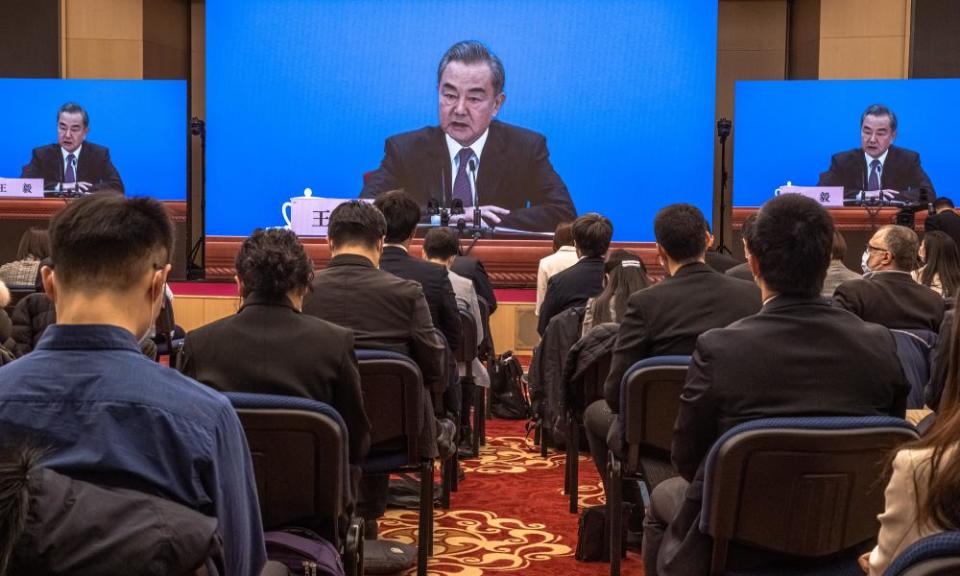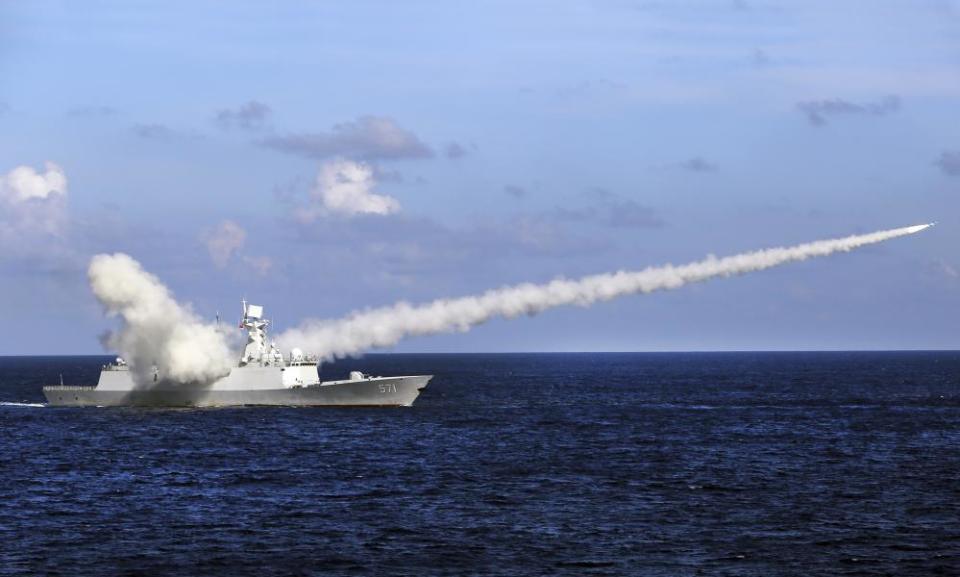China calls on US to drop Trump-era sanctions and warns against 'bullying'

China’s top diplomat has called on the US to drop the sanctions and restrictions introduced by Donald Trump and warned against international “hegemony and bullying” and interference in what Beijing considers internal affairs, including Taiwan, Hong Kong, Xinjiang and the South China Sea.
On day three of China’s annual National People’s Congress (NPC), the country’s foreign minister, Wang Yi, signalled that Beijing intended to hold firm against growing international criticism of its perceived expansionist and hostile activity and domestic human rights abuses.
Speaking at a press conference on Sunday, at which he only took pre-vetted questions from selected journalists, Wang said “candid communication” with the US was necessary to avoid “strategic missteps and conflict”, and that cooperation on issues including the Covid-19 pandemic, economic recovery and climate change should be the main bilateral goal.
“We hope the United States will move in the same direction and remove all its unreasonable restrictions on bilateral cooperation as soon as possible, not create new obstacles,” he said, an apparent reference to the sanctions and legislated restrictions on Chinese trade, diplomacy, and media introduced by Trump and which Joe Biden has said will be reviewed.
Wang also accused the US and other western countries of using “the concept of freedom of navigation” to provoke instability in the South China Sea and undermine peace in the region.

Biden has said “growing rivalry” with Beijing is a key challenge for the US. National security analyses have repeatedly identified China and Russia as top countries of concern, and the current secretary of state, Antony Blinken, said China was this century’s “biggest geopolitical test”.
In response to a question about whether there was any room for China to make concessions on a list of human rights and geopolitical concerns raised by the US and its allies, Wang said Beijing was willing to communicate with all sides but “will not accept groundless accusations or defamation”.
“The issues you refer to are mostly internal affairs and the Chinese people … can best decide what is the right thing for China to do,” he said.
Wang later said he hoped Biden would show a “clear departure from the previous administration’s actions of crossing the line and playing with fire” when it came to Taiwan.
“The two sides of the Taiwan Strait must be and surely will be reunified … and this reflects the will of the entire Chinese nation,” he said. “We have the capability to thwart Taiwan separatist elements in whatever form … There is no room for compromise or concession from the Chinese government.”
Beijing considers Taiwan to be a part of China and has vowed to unite the regions, by force if necessary, offering Taiwan an existence under the “one country two systems” principle which has governed Hong Kong. Taiwan’s leadership and a growing majority of its citizens reject the idea that it is a part of China, and have become increasingly wary after watching the crackdown on opposition in Hong Kong.
A draft decision was formally submitted on Friday to the NPC, considered a rubber-stamping body for the Communist party’s legislation, which would ensure only party loyalists could govern Hong Kong. The decision includes a proposed vetting process for political candidates that combined with the national security law has been labelled the end of opposition in the city.
Wang said on Sunday the “move to improve” Hong Kong’s electoral system and ensure only “patriots” could govern was needed to advance the “one country two systems” principle and restore stability. He said it was “totally lawful, constitutional, and justified”.
“Loyalty to the motherland is a core ethic … and a requirement anywhere in the world,” Wang said. “How can we expect someone who does not love his motherland to truly love Hong Kong?”
Wang also praised China’s growing alliance with Russia, saying the two countries had stood shoulder to shoulder in combatting both the coronavirus and “political virus”. He said it was imperative under the current circumstances” that Beijing and Moscow should be each others strategic support and global partner, and pledged that the two governments would firmly support each other in upholding national interests and opposing “colour revolutions”.
In his opening remarks, Wang praised China’s diplomacy during 2020, singling out its response to the pandemic and work to supply 43 countries with vaccines developed in China, and its role in advocating “peace, development, democracy and freedom as common values of humanity”.

 Yahoo Movies
Yahoo Movies 